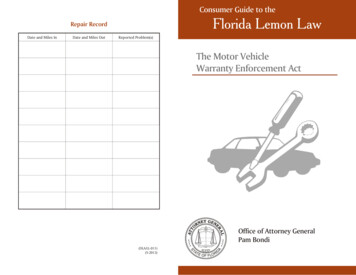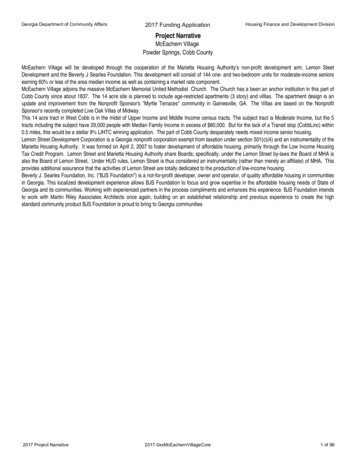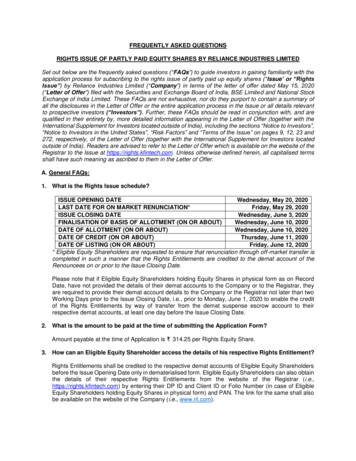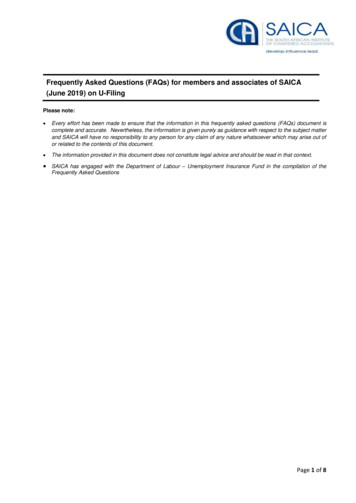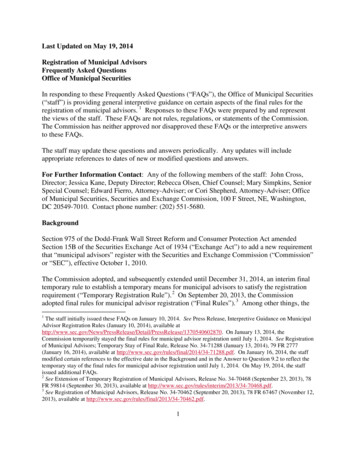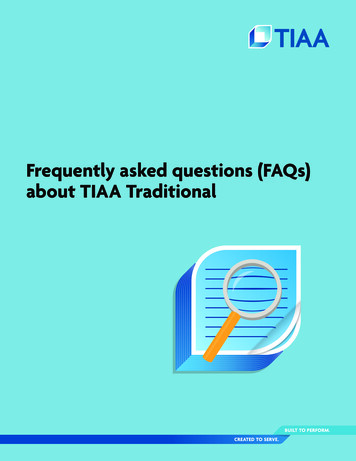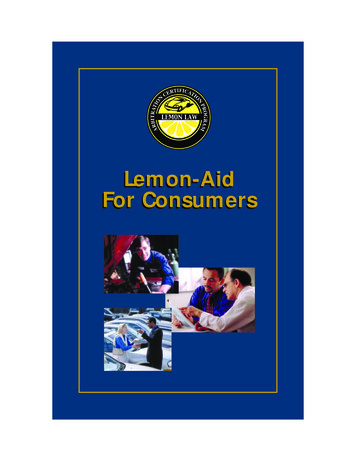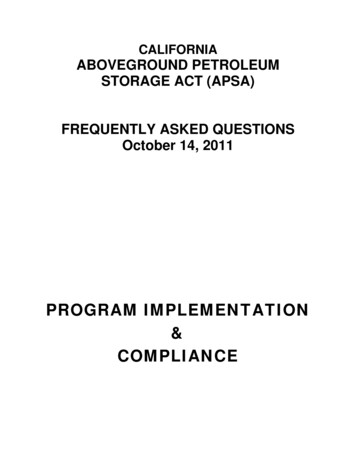
Transcription
Frequently Asked QuestionsLemon LawBackgroundQ1:What does the new law provide for?A1:More Clarity on Burden of Proof and Rights Period: Under theLemon Law, if a defect is detected within 6 months, it is presumedthat the defect existed at the time of sale or delivery and thelemon law provisions apply, unless the seller can prove otherwise,or if such a presumption is incompatible with the nature of thegoods (for example, perishables and food are not expected to lastbeyond their normal shelf lives.) Beyond 6 months, consumers canstill seek remedies but they will need to bear the burden ofproving that the defect existed at the time of delivery.Additional Remedies: Under the Lemon Law provisions, theconsumer can demand the seller to repair, or replace thedefective product. If the seller fails to repair or replace the goodswithin a reasonable time or without significant inconvenience toconsumer, the consumer may ask for a reduction in price or returnthe product for a refund. The seller can offer an alternativeremedy from the one demanded by the consumer if the cost ofthe remedy demanded is disproportionate in comparison.Coverage of the LawQ2:What does Lemon Law cover? Does it cover secondhand goodsand sale/discounted items?A2:The Lemon Law covers all consumer goods, except real propertyand rental/leased goods. Perishables and consumables are alsocovered but the presumption that defects reported within sixmonths exists at the point of delivery will only apply up to thenormal shelf-life of the perishable/consumable, if the shelf-life isless than six months.The proposed lemon law applies to both new and secondhandgoods, and vehicles, as protection is likely to be most needed for
such goods. This is also in line with Lemon Laws in overseasjurisdictions. However, the terms may apply differently since itwould be reasonable to expect new goods to be in bettercondition than secondhand goods. The courts will take intoaccount the age and price paid for a secondhand good whendetermining reasonableness of claim. For example, someonebuying a 10-year-old car from a dealer could not reasonablyexpect it to be like a brand new car. However, he can expect it toperform in a manner that may be reasonably expected of a car ofthat mileage and model. If it does not do so, the consumer canseek remedies from the dealer.Discounted products or sale items, with slight defects orlimitations are not excluded from the law, but any defects orlimitations of these goods should be pointed out to the consumerbefore the transaction, and the retailer would not be held liablefor them.Q3:Can secondhand goods, discounted products or “display sets”sold on the understanding that they had slight defects beexcluded from Lemon Law, or be sold “As is” or “As seen”?A3:The retailer cannot contract out his obligations under the law.Even under existing laws, retailers cannot deny the consumer hisrights to remedies under the proposed law, for example by simplydisplaying a notice saying, “we do not give refunds under anycircumstances” or that “an item has been sold as it is”. Anydefects or limitations of the goods should be pointed out to theconsumer before the transaction, and the retailer would not beheld liable for those defects or limitations. In this case, retailersshould be transparent at the point of sale, for example, throughappropriate labelling and disclaimers. For clarity, the retailer maydocument such defects and limitations on the sales contract,invoice or packaging.Q4:Are online transactions covered? Can action be taken againstoverseas online traders? What about gaming services and virtualgoods?A4:Online transactions are covered under the Lemon Law, as in otherjurisdictions such as UK and EU.
The Lemon Law does not distinguish between local or foreignonline traders. Generally, Singapore law applies if the contractstipulates it as the governing law of the contract or if the contractis concluded in Singapore. However, it may not be possible toenforce the judgment against the overseas trader if he has nopresence in Singapore.The proposed Lemon Law does not cover services (i.e. gameservices) as the remedies under the lemon law regime are tailoredfor goods, and are generally inappropriate for services. Forexample, it is impossible to return a service which has alreadybeen rendered. This is in line with Lemon Laws in other foreignjurisdictions.The Lemon Law covers purchase of physical goods made overonline platforms, but not virtual goods.DefinitionsQ5:How do you define what is a Lemon or what is a defectiveproduct?A5:The Lemon Law provisions apply in the event of non-conformity tocontract at the time of delivery (e.g. a sale of goods contract).Non-conformity to contract is defined under existing laws such asthe Sale of Goods Act, and includes situations such as the productnot being of satisfactory quality, not fit for the purpose it ispurchased for, or not meeting reasonable performanceexpectations, taking into account description of the goods, theprice and other relevant circumstances.“Satisfactory Quality” includes their state and condition, as well asthe following aspects:(a) fitness for all the purposes for which goods of the kind inquestion are commonly supplied;(b) appearance and finish;(c) freedom from minor defects;(d) safety; and
(e) durability.Q6:How do you define terms like 'disproportionate', 'significantinconvenience' or ‘reasonable time’?A6:One remedy is disproportionate in comparison to the other if theimposed costs on the supplier is unreasonable, taking into account:(a) the value which the goods would have if they conformed to theapplicable contract;(b) the significance of the lack of conformity to the applicablecontract; and(c) whether the other remedy could be effected withoutsignificant inconvenience to the transferee.As for ‘reasonable time’ and ‘significant inconvenience’, section12C(5) provides that these issues are to be determined by thenature of the goods and the purpose for which the goods wereacquired. It is not practicable to define these terms in greaterdetail given the huge diversity of goods in the market.The courts will thus interpret the provisions and determinedisputes.Industry associations may adopt codes or guidance for theirmembers as appropriate dispute resolution practices. Industrystandards and guidelines may also indirectly influence the court’sview.Q7:How many times is a retailer entitled to repair the productbefore he has to do a replacement? Why can’t we specify in thelaw terms of defect, and conditions for remedy, especially forclothes and big-ticket items?A7:Given the diverse range of products, it may not be possible tospecify a reasonable number that can apply to all goods.Nevertheless, the supplier is required to repair or replace within areasonable timeframe, and without causing significantinconvenience to the buyer. Otherwise, the buyer is entitled to ask
for rescission or reduction of price. The courts will interpret theprovisions and determine disputes accordingly.Beyond the guidelines provided by the Sales of Goods Act,stipulating the exact terms of defect and remedy is also notpractical and will make the law complicated in application. It willalso remove the flexibility for both retailer and consumer to workout mutually acceptable arrangements. The law must beadaptable to new goods that come on to the market. It will not bepossible to change the law every time a new product is launched.ClarificationsQ8:What constitutes a proper replacement, can it be a usedproduct? After the "lemon" is replaced, is the consumerprotected for another 6 months after replacement?A8:The replacement should conform to contract, that is, be of thequality, make, model, and condition that is expected at the pointof sale. Wear and tear due to usage by the consumer will beconsidered, and the replacement need not always be new. If theconsumer is not satisfied with the replacement, he could ask forother remedies, such as a reduction in price, or return the productfor a refund.The 6 months where the burden of proof is placed on the retailercannot be renewed with each replacement. However, the LemonLaw provisions for remedies of repair, replacement, discount orrefund will still apply beyond this 6 months period, but theconsumer will have to prove that the replacement provided didnot conform to the contract.Q9:Consumers are covered by the new law for defects that manifestwithin six (6) month. How is this period derived?A9:The six month period is consistent with that set in UK and EU laws.The six month period is also not too long, such that it makes itdifficult for the seller to prove that the defect was not present atthe time of delivery.
Q10: Who is responsible for providing repairs/ replacement/rescission/ discounts under the new Lemon Law regime? Is it theretailer, distributor or manufacturer?A10: Contractual liability only binds the parties to the contract. If it wasthe retailer who entered into a sales contract with the consumer,the retailer will be directly responsible for theexchange/refund/discounts arising from non-conformity of thegoods supplied with the contract.The retailer may seek recourse against his supplier based on hiscontract with the supplier, or exercise his rights under the Sale ofGoods Act as a purchaser in respect of the supplier (in particular,the implied terms for non-consumers under the Sale of Goods Actare likely to apply). Under the Act, the retailer can return faultygoods to his supplier on grounds that the goods do not conform tocontract.If the manufacturer or supplier has separately granted a warrantyto the consumer (e.g. under a warranty card), the consumer willcontinue to have rights against the manufacturer or supplierunder that separate warranty.Q11: When will the law come into force? Are contracts entered intobefore that date eligible for recourse under Lemon Law?A11: The Lemon Law will only take effect on 1st September 2012. Salecontracts entered into before the date cannot be covered underthe new law.Procedures on the GroundQ12: Are vouchers acceptable for refunds in lieu of cash?
A12: The seller may make the refund in cash or using the same mode ofpayment as the original transaction, e.g., if the payment wasmade in cash, the consumer has a right to a refund in cash. Theconsumer may choose to accept vouchers or a credit note, ifoffered. If the consumer made payment using credit or vouchers,the seller can choose to refund via credit or vouchers.Q13: Can the consumer ask for costs or compensation for transportand time wasted when he sends the product for repairsrepeatedly?A13: Under the proposed law, the retailer must bear any necessarycosts incurred in providing repairs (including the cost of anylabour, materials, postage, or delivering the goods for repair). Ifthe retailer is unable to provide the repairs within a reasonabletime and without causing significant inconvenience to theconsumer, the consumer may demand an alternative remedy,meanings a replacement, reduction in price or a refund.Cars and Hire PurchaseQ14: When a dealer receives a trade-in vehicle from a customer, andsubsequently sells it to another customer, and it is thendetermined that the vehicle is a "Lemon", is the dealer able toseek recourse from the customer whom the dealer purchasedthe vehicle from? How does the dealer claim for consequentiallosses if any?A14: The proposed lemon law applies only to business-to-consumertransactions. It would usually not apply to consumer-to-businesstransactions. Therefore, the proposed lemon law would notusually apply in relation to transfer of the trade-in vehicle fromthe first customer to the dealer.However, the usual remedies that arise from the contractbetween the dealer and the first customer continues to apply.These include the ability to sue the customer who traded-in thevehicle if the vehicle does not conform to the contract. The Sale ofGoods Act will also apply, and the dealer can, under the law, reject
the traded-in vehicle for serious defects or non-conformity. Thedealer may protect himself by clearly stipulating the obligations ofthe trade-in customer in writing.Q15: For a hire purchase vehicle, who is responsible to process claimsfrom the Hirer (i.e. consumer)? The Owner (i.e. Financecompany/bank) or the Seller (the retailer who sold the product)?A15: Under a hire purchase agreement, the finance company pays theseller and becomes the owner of the vehicle. The hirer does notbecome the owner until the final payment is made. However, ifthe seller is open to the hirer approaching them directly, this ispossible.The position is similar in UK, Ireland and NZ, where the financecompany is held liable until ownership is transferred to the hirer.Since the seller has effectively sold the car to the finance company(car was transferred from seller to owner), the finance companycan seek recourse from the seller for breach of implied terms(i.e.reject product or claim damages). However, as the financecompany is not a consumer, the implied terms are treated aswarranties. This means that the finance company may not have aright to reject for slight defects, and can only claim damages.The finance company can however, contract with the seller toensure that it has the necessary indemnities to protect itself in theevent that the vehicle is rejected or the agreement is rescinded.Q16: The Hire Purchase Act currently contains value caps (e.g. Carvalue cannot exceed 55,000 excluding COE). Does this mean Icannot be protected by the Lemon Law provisions if my hirepurchased car exceeds that value?A16: The value caps in the HPA will not apply to the implied terms inthe HPA and the proposed Lemon Law provisions. Cars of all valuewill therefore be covered.Queries on COE/ARF Transfer Eligibility (from MOT/LTA)
Q17: Why were specific conditions imposed on the transfer eligibilityof COE/ARF from a defective vehicle to its replacement?A17: To encourage and facilitate the replacement of a defectivevehicle, LTA will allow the transfer of the ARF and Certificate ofEntitlement (COE) from a defective vehicle to the replacementvehicle only if the defective vehicle meets the following criteria:(i) The defect occurs within 1 year of the vehicle’s registration orwithin a mileage of 20,000 km, whichever is earlier; and(ii) At least 3 attempts have been made to repair the defect, or atleast 1 attempt if the defect is safety-related, within 1 year fromthe date the defect was reported.The conditions have been drawn up with reference to overseaslegislation and are intended to minimise tax leakage due tofrivolous claims. The stipulated conditions serve to discourageabuse of the proposed scheme.Q18: Is there a possibility of re-registering a Lemon vehicle (fortrader’s own use as rental vehicle, or subsequent sale to willingconsumers)?A18: The defective vehicle’s COE and ARF have already beentransferred to the replacement vehicle. Thus it is not possible forthe defective vehicle to be retained for the trader’s own use as arental vehicle or for subsequent sale.
Lemon Law, if a defect is detected within 6 months, it is presumed that the defect existed at the time of sale or delivery and the lemon law provisions apply, unless the seller can prove otherwise, or if such a presumption is incompatible with the nature of the goods (for example, perishables and food are not expected to last .
